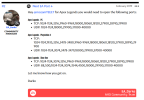A couple of days ago I was getting really poor connection over 2.4 GHz. I swapped to 5 GHz and that cleared it up. Yesterday, the PS5 connected to 2.4 GHz again by default and connection was awful. I tried to swap to 5 GHz and it wasn't having it. After a fair bit of switching things off and on again, it finally connected and I could play online. Today, PS5 connects to 2.4 GHz again. I swap to 5 GHz. It won't connect. Then finally when it does, it says it can't get onto the internet. I swap to 2.4 GHz and it connects just fine to the internet but the signal quality is atrocious. Swap back to 5 Ghz and it won't connect. After a spell, it's downloading about 8 KB/s on 5 GHz. Obviously nothing changed on the router end to cause.
PS5 is the first PS console that I feel is a bit crap. Sony losing their mojo.
Also, definitely going with Ethernet over the weekend.
You need to lock the channel to the one supported by your ps5 region.




